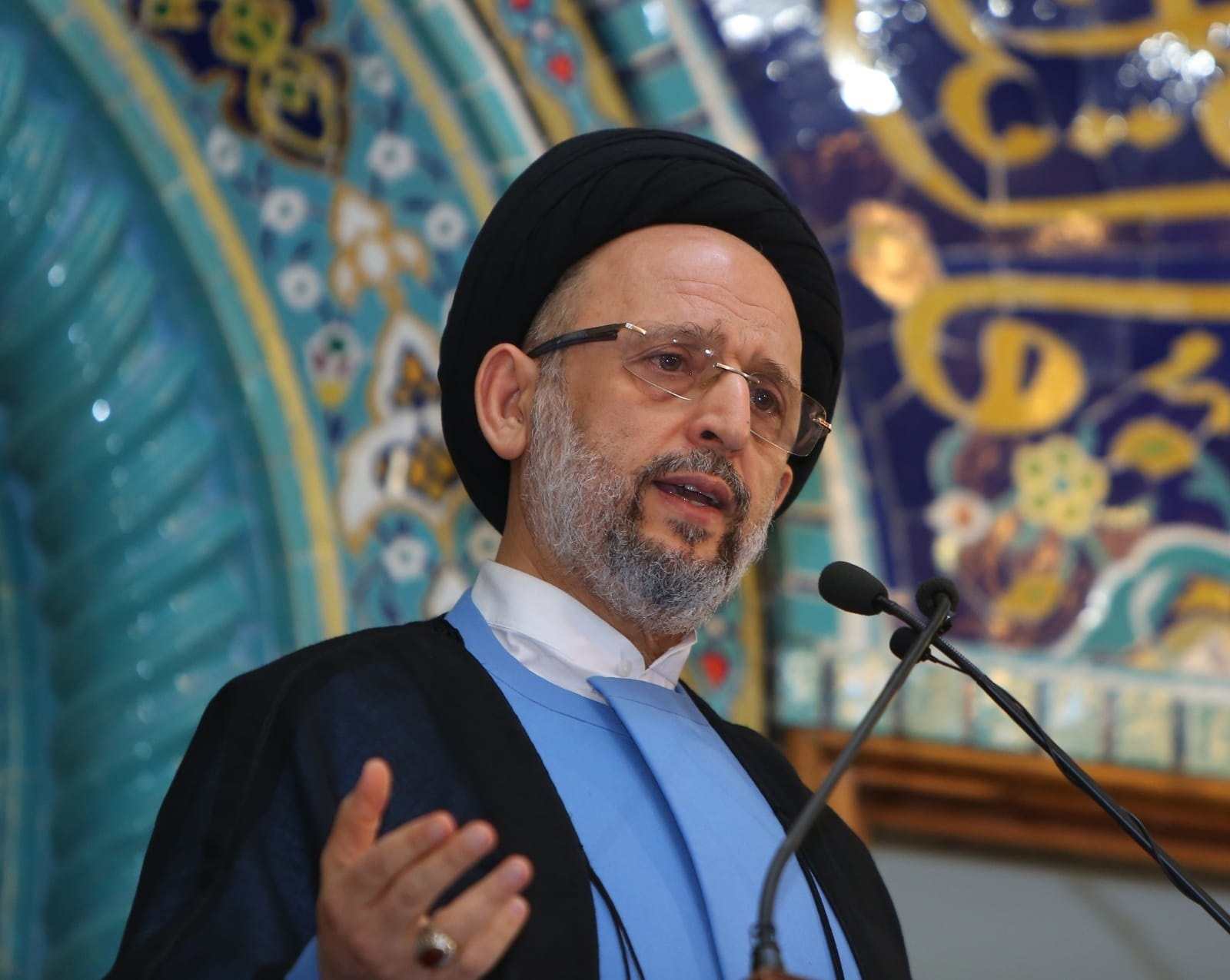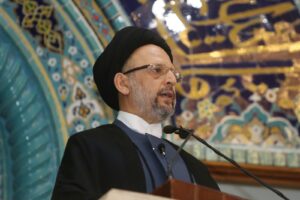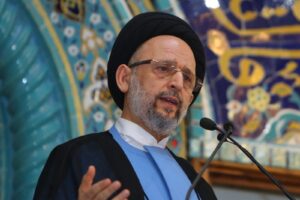Lessons from the Life of Imam al-Askari (a.s.)
In the name of Allah, the Compassionate, the Merciful
His Eminence, Sayyed Ali Fadlallah, delivered the two Friday prayer sermons at the Imamain Al-Hassanain Mosque; Rabi al-Awwal 6, 1447H/August 29, 2025. Several prominent religious scholars, dignitaries and hundreds of believers attended the Jumu’a prayer. Following is a summary of his sermons:
The first sermon
Lessons from the Life of Imam al-Askari (a.s.)
Allah, the Most Exalted, says in His Glorious Book:
“And We made them leaders who guide by Our command, and We inspired them to do good deeds and establish prayer and give zakah; and they were worshipers of Us.” — Truthful is Allah, the Most Exalted.
We meet today on the seventh of the month of Rabi’ al-Awwal, on the anniversary of the passing of one of those mentioned in this verse, Imam Hasan ibn Ali al-Askari (a.s.). who was given the title “al-Askari” because of the place where he lived; which was called “al-Askar,” one of the neighborhoods of Samarra, at that time the capital of the Abbasid Caliphate.
This Imam endured, during his imamate which lasted six years, siege, restriction, imprisonment, and strict measures to prevent him from communicating with the people.
He spoke of the magnitude of this suffering when he said: “No one among my ancestors was hurt like I was,” to the point that he would send instructions to his followers: “Let no one greet me, nor wave to me with his hand, nor signal to me, for you are not safe…”
This indicates the degree to which the Abbasid authority monitored anyone who met the Imam, even those who merely greeted him. This was because the Abbasid caliphs feared the presence of Imam al-Askari (a.s.) and the position he had reached in the hearts of the people, due to his vast knowledge, good character, humility, generosity, and dignity, which made him occupy everyone’s hearts, winning their admiration, even among those who did not follow his imamate.
We pause here at two texts that indicate the high regard this Imam had reached in the hearts of people, even among those who were not committed to his imamate.
First: From the Abbasid minister , Ubaydallah Yahya ibn Khakan, when his son Ahmed asked why he revered and honored Imam Hasan al-Askari (a.s.) when meeting him or speaking of him, despite not being among the followers of Ahl al-Bayt (a.s.), he said: “I have never seen nor known anyone like al-Hassan in his guidance, calmness, chastity, nobility, and his stature among his family, the Sultan, and all of Banu Hashim, giving him precedence over his elders and distinguished ones. I asked no one among Banu Hashim, commanders, scribes, judges, jurists, or other people except that I found him held in the highest reverence, dignity, high rank, and commendable standing.”
He then said: “Know, my son, that if the caliphate were removed from the Abbasids, no one would deserve it except him, because of his virtue, piety, worship, excellent character, and righteousness.”
Second: When the Abbasids asked Saleh ibn Wasif, who was in charge of imprisoning Imam al-Askari (a.s.), to “tighten the restrictions and not ease them,” because they saw leniency in his handling of the Imam, he said to them: “What can I do with him?! I entrusted him to two men, who are among the most vicious I could find, and they turned out to be devoted in worship, prayer, fasting.”
Yet, all the suffering this Imam endured did not prevent him from fulfilling his mission. He worked on two matters:
- Confronting intellectual and doctrinal deviation, and juristically guiding and educating the nation.
- Preparing the nation for how to deal with the occultation of Imam al-Mahdi (a.j.) and the challenges that would occur afterward.
Today, on this occasion, we will refer to some of what he taught in this regard:
First Hadith: He said (a.s.):
“A believer shows happiness on his face, keeps his sadness in his heart, has a broad and generous chest, and a humble soul.”
Here, he wanted to show the image a believer should have: always smiling, spreading optimism wherever he is, carrying in his heart the concerns of those who suffer, feeling sorrow for them if they do not follow the path of faith that Allah has prescribed for them, which ensures them dignity in this life and the Hereafter. The believer has a broad heart, does not narrow it against others, accommodates those who differ with him, even those who wrong him, and does not repay evil with evil, but responds with goodness to expand his presence and the influence of his beliefs. He is humble, no matter how high his rank, wealth, or authority.
Second Hadith: “The most knowledgeable of people about the rights of his brothers( believers), and the most hardworking in fulfilling them, is the greatest in rank before Allah.”
Here, the Imam (a.s.) shows the path to great status before Allah: to know the rights of believers and fulfill them. These rights include advising them, helping them in need, sharing in their pain and sorrow, covering their mistakes, settling debts, bringing joy to them, and praying for them in their absence.
Third Hadith: “Reaching Allah is a journey that can only be achieved by riding(worshipping through) the night.”
The Imam (a.s.) wanted to explain that the journey to Allah requires a specific means—night prayer—which the Qur’an emphasizes: “Indeed, the rising by night is harder and more suitable for recitation” \[Al-Muzzammil 73:6]. Hadiths also emphasize this, e.g., “If a servant dedicates himself to his Lord in the dark of the night and calls Him, Allah establishes light in his heart. When he says: ‘O my Lord, O my Lord,’ Allah, the Most Exalted, calls him: ‘I am here, My servant, ask Me, and trust Me, I will take care of you.’ Then He says to His angels: ‘Look at My servant, he has devoted himself to Me in the dark night while the idle are distracted and the heedless asleep; witness that I have forgiven him.’”
Night prayer includes worship, Qur’an recitation, seeking forgiveness, remembrance of Allah, and above all, performing the night prayer.
Fourth Hadith: “The greatest in status is he who abandons what does not concern him.”
The Imam (a.s.) indicates that a believer who wants high status with Allah must refrain from meaningless speech, avoid things that do not increase his knowledge or benefit others, and stays away from futile debates. As Amir al-Mu’mineen (a.s.) warned someone who spoke uselessly: “O man! You dictate to your scribers (those who recod your acts and sayings) a book to your Lord; speak about what concerns you and leave what does not concern you.”
He (a.s.) said: “I am amazed at those who speak of what does not benefit them in this world and whose deeds will not be recorded in the Hereafter.”
Imam Hussein (a.s.) also said: “Do not speak about what does not concern you, for I fear burden upon you—most people’s sins come from speaking about what does not concern them. Do not speak about what concerns you until you see the proper time and place for it.”
Dear loved ones, our loyalty to this Imam on the anniversary of his passing is not only by holding gatherings in his name or visiting him, but by practicing the values and teachings he advocated, which he suffered and sacrificed for, being faithful to them, understanding them, and applying them in our lives and the lives of others. At the same time, we must be loyal to the one he left behind to fill the earth with justice and fairness.
Peace be upon Imam Hassan al-Askari (a.s.) on the day he was born, the day he departed to his Lord, and the day he will be raised alive.
Second Sermon
O worshipers of Allah, I advise you and myself with what Imam al-Hassan al-Askari (a.s.) advised his companion: “I advise you to fear Allah, establish prayer, and give Zakat, for prayer is not accepted from one who withholds Zakat. I advise you to forgive sins, restrain anger, maintain kinship ties, assist brothers (believers), help them in hardship and ease, show forbearance towards ignorance, study religion deeply, verify matters carefully, adhere to the Qur’an, display good character, enjoin good, and forbid evil.”
Allah, the Most Exalted, , said: “No good is there in much of their secret conversation except for those who command charity, or goodness, or reconciliation between people. And whoever does that seeking the pleasure of Allah, We will give him a great reward.”
Avoid all sins, and maintain night prayer, for the Prophet (p.) advised Ali (a.s.): “O Ali, maintain night prayer three times. Whoever neglects night prayer is not one of us.” …
This is Imam al-Askari’s (a.s.) advice, intended as a methodology for his followers, and our loyalty to him is measured by our adherence to it
Beginning with the ongoing Israeli attacks on Lebanon, through the raids we witnessed yesterday targeting the South and Beqaa, or incursions into villages near the border to demolish homes and prevent any life from continuing within them, aiming to empty them of their inhabitants who insist on returning or staying. This is part of the enemy’s plan to create a buffer zone, under the pretext of protecting settlements, or through drones over Lebanese regions, without any official response from the Lebanese state or the committee supervising the ceasefire.
Meanwhile, the visit of the American envoy, expected by many to bring a positive message from the Zionist entity, confirming step-for-step implementation from the Lebanese government after recognizing the monopoly of weapons by the state… in fact demonstrated that the American administration has no intention of pressuring the Zionist entity. Their demands reflect only the entity’s security interests, disregarding Lebanon’s security. The envoy acted not as a diplomatic representative but as a supervisory authority imposing hegemony over Lebanese decision-making.
In the face of these events, we reiterate our call to the Lebanese government to act out of concern for the country’s sovereignty, dignity, and freedom, and to be faithful to the great sacrifices made and still being made in this path. Lebanon is not weak; its history shows it has never humiliated itself. While costly, this is how nations are protected, sovereignty is maintained, and dignity preserved.
We renew our call for dialogue, cooperation, and solutions that protect the country from dangers, preserve its sovereignty, and prevent discord between Lebanese citizens or between the army and the resistance. We trust the Lebanese people, despite disagreements, will not allow discord, having experienced its horrors and dangers.
The enemy continues its efforts to weaken Syria through raids and attempts to divide it under the guise of protecting minorities, as in Suwayda today, intending to weaken the country and prevent its stability. Unity among Syria’s components and removing grievances is essential to counter this.
In Gaza, the Zionist enemy continues its destructive campaign and blockade, unprecedented in contemporary history, deliberately targeting journalists and anyone attempting to report the truth. The world now understands that this is not about hostages but a war of extermination and displacement, aimed at removing Palestinians from their land and ending the Palestinian cause, continued in the West Bank through settlements and targeted assassinations.
Finally, on the anniversary of the disappearance of Imam Sayyed Musa al-Sadr and his companions, who represented unity among Lebanese citizens and resisted sectarian policies of hegemony, advocating for all Lebanese and Arab causes, especially Palestine, paying a high price for his loyalty and dedication to these causes. On this occasion, we call upon the Lebanese state and those concerned for the country to pursue these goals and investigate this crime, which is a cause not to a single sect, but to all Lebanese, Arabs, Muslims, and free people.




